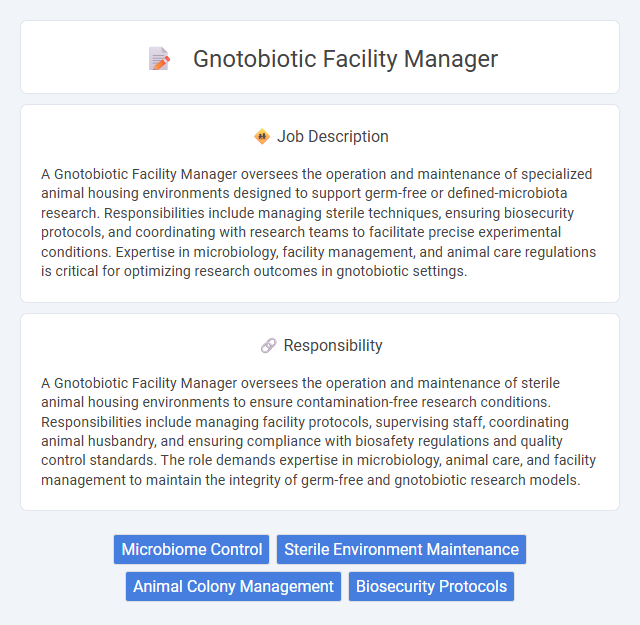
A Gnotobiotic Facility Manager oversees the operation and maintenance of specialized animal housing environments designed to support germ-free or defined-microbiota research. Responsibilities include managing sterile techniques, ensuring biosecurity protocols, and coordinating with research teams to facilitate precise experimental conditions. Expertise in microbiology, facility management, and animal care regulations is critical for optimizing research outcomes in gnotobiotic settings.
Individuals with a strong attention to detail and a background in microbiology or veterinary science are likely well-suited for the role of a Gnotobiotic Facility Manager. Candidates who thrive in controlled, sterile environments and have a high level of responsibility for maintaining animal health and biosecurity will probably excel in this position. Those with sensitivity to strict protocols or stress related to maintaining contamination-free conditions might find the job challenging.
Qualification
Gnotobiotic Facility Managers require a strong background in microbiology, animal science, or biomedical engineering, with at least a bachelor's degree, often preferred at the master's level. Expertise in maintaining sterile environments, aseptic techniques, and managing germ-free animal colonies is essential for ensuring experimental integrity. Proficiency in facility operations, including equipment sterilization protocols, biosafety standards, and laboratory information management systems, enhances successful management of gnotobiotic research environments.
Responsibility
A Gnotobiotic Facility Manager oversees the operation and maintenance of sterile animal housing environments to ensure contamination-free research conditions. Responsibilities include managing facility protocols, supervising staff, coordinating animal husbandry, and ensuring compliance with biosafety regulations and quality control standards. The role demands expertise in microbiology, animal care, and facility management to maintain the integrity of germ-free and gnotobiotic research models.
Benefit
Working as a Gnotobiotic Facility Manager likely offers benefits such as specialized skill development in managing sterile environments and microbiome research. Experienced managers may have higher earning potential due to the niche expertise required. Opportunities for career advancement could arise within research institutions or biotech companies focusing on controlled microbial studies.
Challenge
Managing a gnotobiotic facility probably involves significant challenges related to maintaining sterile environments and preventing contamination at all times. The complexity of coordinating animal husbandry, complex equipment, and strict protocols may require exceptional attention to detail and problem-solving skills. Success in this role likely depends on adapting quickly to unexpected issues while ensuring compliance with regulatory standards.
Career Advancement
Gnotobiotic Facility Manager roles offer significant career advancement opportunities in biomedical research and microbiome science. Professionals in this position gain expertise managing sterile animal environments critical for experimental reproducibility, positioning them for leadership roles in lab management or specialized microbiome research. Mastery of gnotobiotic techniques and facility operations enhances prospects for advancement to senior management or research coordination in academic and pharmaceutical sectors.
Key Terms
Microbiome Control
Overseeing a gnotobiotic facility requires precise microbiome control to maintain germ-free or defined microbial environments critical for experimental integrity. The manager ensures strict aseptic techniques, sterilization protocols, and environmental monitoring to prevent contamination and preserve specific microbial communities. Expertise in microbiota manipulation and advanced facility management supports reproducible research outcomes in microbiome studies.
Sterile Environment Maintenance
Gnotobiotic Facility Managers ensure the integrity of sterile environments by implementing rigorous sterilization protocols and continuous monitoring to prevent contamination in controlled animal research settings. They manage autoclaving procedures, HEPA filtration systems, and maintain strict aseptic techniques to protect germ-free and defined microbiota animal colonies. Expertise in environmental control and validation processes is critical for sustaining pathogen-free conditions and supporting experimental reproducibility.
Animal Colony Management
Gnotobiotic Facility Managers specialize in maintaining sterile and controlled animal colonies, ensuring the integrity of germ-free or defined-microbiota environments critical for microbiome research. They oversee breeding programs, monitor health status, and implement sanitation protocols to prevent contamination in germ-free isolators and barrier systems. Expertise in animal husbandry, microbiological techniques, and facility biosafety standards is essential to support experimental reproducibility and data reliability in gnotobiotic studies.
Biosecurity Protocols
Gnotobiotic Facility Managers implement rigorous biosecurity protocols to maintain sterile environments essential for germ-free and gnotobiotic animal research. They oversee sterilization processes, monitor entry restrictions, and enforce contamination controls to protect sensitive experimental conditions. Expertise in decontamination procedures and facility access management ensures the reliability and integrity of microbiome-related studies.
 kuljobs.com
kuljobs.com